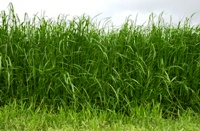Green energy

Grass, rushes and bracken could provide energy
11 March 2011
International research at Aberystwyth University could provide a new source of clean energy and help protect nature-rich land in Wales.
The University’s Institute of Biological, Environmental and Rural Sciences (IBERS) is working with research centres in Germany and Estonia to develop new ways of managing under-used grasslands and making them productive.
Scientists are working on six experimental sites in each country – using different native grasses and ‘nuisance’ plants like rushes and bracken to create energy.
PROGRASS is a 3.5 year project funded through the European Commission’s LIFE+ grants and is aimed at making better use of grassland on protected sites and increasing biodiversity too by providing a sustainable way of managing the land.
The research could also lead to a new source of income for Welsh farmers and more use of clean energy.
How it works
A specially developed processing unit is now in place at IBERS’s Gogerddan campus and is processing up to 400kg a day of silage prepared from rough pastures, converting it into liquids that produce natural gas and a by-product that can be burnt as a solid fuel or converted into other fuels.
Three of the six experimental sites in Wales are on National Nature Reserves, managed by the Countryside Council for Wales.
The grasses and other plants growing at the sites are typical of vegetation in Wales – they are traditionally considered to be of low value as feed for animals and so are in danger of being under-grazed and abandoned, threatening their biodiversity.
A double win
“The silage is treated with hot water and then put through a screw press to extract liquids that are then fermented to produce natural gas,” said one of the IBERS’s scientists leading the work, Dr. Mariecia Fraser.
“The gas produced is upgraded and a by-product of the pressing procedure can also be used for energy production.
“This research could offer a double environmental win: enhanced biodiversity and renewable energy.”
For IBERS’s Director, Professor Wayne Powell, PROGRASS is another example of the Institute’s long record of conducting world-class academic research that is of practical use to both UK farmers and society in general.
“As well as plant-breeding and animal husbandry, IBERS is now gaining an International reputation for research in developing crops for environmental improvements”, he said. “Potentially, such research is of immense value to Wales and the world”.



